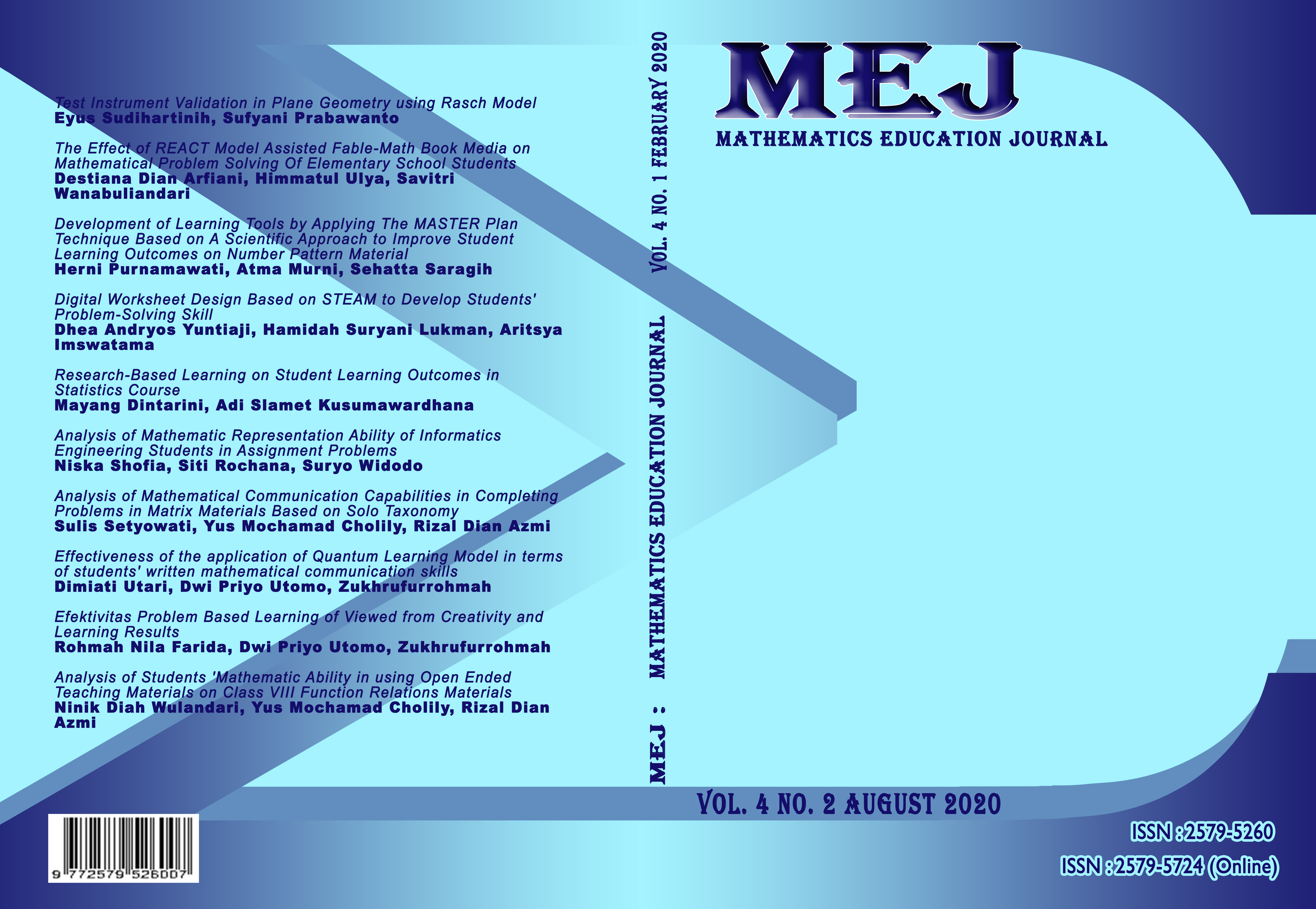Test Instrument Validation of Two Dimensional Geometry Using Rasch Model
DOI:
https://doi.org/10.22219/mej.v4i2.11357Keywords:
Validation, instrument, descriptive quantitative, geometry, Rasch modelAbstract
The purpose of this study is to describe the results of the analysis of the quality of the mathematical students' initial ability in the field of geometry concepts through the Rasch model. This research is descriptive qualitative research at a university in Indonesia. The participants of this study were 44 students who studied analytic geometry (30 women and 14 men). This research instrument is a matter of description of the concept of geometry as many as four questions. Based on the results of the study note that all items meet the standard criteria as measurement so that the questions can be used as instruments in further research.
Downloads
References
Bond, T. G., & Fox, C. M. (2007). Applying The Rasch Model: Fundamental Measurement in the Human Sciences. Mahwah, N.J.: Lawrence Erlbaum Associates Publishers. Boone, W. J., Staver, J. R., & Yale, M. S. (2014). Rasch Analysis in the Human Sciences. Springer Dordrecht Heidelberg New York London. Boone, W. J., Townsend, J. S., & Staver, J. (2011). Using Rasch Theory to Guide the Practice of Survey Development and Survey Data Analysis in Science Education and to Inform Science Reform Efforts: An Exemplar Utilizing STEBI Self-Efficacy Data. Science Education, 95(2). Folastri, S., Rangka, I. B., & Ifdil. (2017). Student’s Self-concept Profile Based on Gender: a Rasch Analysis. Advances in Social Science, Education and Humanities Research, Volume 118 9th International Conference for Science Educators and Teachers (ICSET). Hidayati, K. (2012). Validasi Instrumen Non Tes dalam Penelitian Pendidikan Matematika. Prosiding Jurusan Pendidikan Matematika. Khumaeroh, S. U., Susongko, P., & M. Shaefur Rokhman. (2017). PENYUSUNAN SKALA SIKAP PESERTA DIDIK TERHADAP MATEMATIKA DENGAN PENERAPAN MODEL RASCH. Jurnal Pendidikan MIPA Pancasakti, 1(1), 35–42. Kimberlin, C. L., & Winterstein, A. G. (2008). Validity and reliability ofmeasurement instruments used in research. American Journal of Health-System Pharmacy, 65(23), 2276–2284. Linacre, J. M. (2006). A User’s Guide to Winstep Ministep Rasch- Model Computer Programme. Retrieved from www.winstep.com. Maseko, J., Luneta, K., & Long, C. (2019). Towards validation of a rational number instrument: An application of Rasch measurement theory. Pythagoras, 40(1), a441. Nisa, K., Susongko, P., & Wikan Budi Utami. (2017). PENYUSUNAN SKALA MINAT BELAJAR MATEMATIKA DENGAN PENERAPAN MODEL RASCH. Jurnal Pendidikan MIPA Pancasakti, 1(1), 35–42. Purnomo, S. (2016). Pengembangan Soal Matematika Model PISA Konten Space dan Shape untuk Mengetahui Level Kemampuan Berpikir Tingkat Tinggi Berdasarkan Model Rasch. Rasch, G. (1968). A MATHEMATICAL THEORY OF OBJECTIVITY AND ITS CONSEQUENCES FOR MODEL CONSTRUCTION. EUROPEAN Meeting on Statistics, Econometrics and Management Science, Amsterdam 2-7 September 1968. Razali, S. N., & Shahbodin, F. (2016). Questionnaire on perception of online collaborativelearning: measuring validity and reliability using Rasch model. Proceedings of the 4th International Conference on User Science and Engineering. Melaka, Malaysia, 1. Sari, D. R., Sekarwana, N., Hinduan, Z. R., & Sumintono, B. (2016). Analisis Tingkat Kepuasan Masyarakat terhadap Dimensi Kualitas Pelayanan Tenaga Pelaksana Eliminasi Menggunakan Pemodelan Rasch. JSK, 2(1). Sumintono, B., & Widhiarso, W. (2014). Aplikasi model Rasch untuk penelitian ilmu-ilmu sosial. Cimahi, Bandung, Indonesia: Trimkom Publishing House. Susdelina, Perdana, S. A., & Febrian. (2018). Analisis Kualitas Instrumen Pengukuran Pemahaman Konsep Persamaan Kuadrat Melalui Teori Tes Klasik Dan Rasch Model. Jurnal Kiprah, 6(1), 41–48. https://doi.org/10.31629/kiprah.v6i1.574 Widhiarso, W., & Sumintono, B. (2016). Examining response aberrance as a cause of outliers in statistical analysis. Personality and Individual Differences, 98, 11–15. https://doi.org/10.1016/j.paid.2016.03.099 Wright, B. D., & Masters, G. N. (1982). Rating scale analysis Benjamin D. Wright Geofferey N. Masters. Chicago: MESA PRESS.
Downloads
Published
Issue
Section
License
Authors who publish with MEJ (Mathematics Education Journal) agree to the following terms:
For all articles published in MEJ, copyright is retained by the authors. Authors give permission to the publisher to announce the work with conditions. When the manuscript is accepted for publication, the authors agree to automatic transfer of the publishing right to the publisher.
Authors retain copyright and grant the journal right of first publication with the work simultaneously licensed under a Creative Commons Attribution-ShareAlike 4.0 International License that allows others to share the work with an acknowledgment of the work's authorship and initial publication in this journal.
Authors are able to enter into separate, additional contractual arrangements for the non-exclusive distribution of the journal's published version of the work (e.g., post it to an institutional repository or publish it in a book), with an acknowledgment of its initial publication in this journal.
Authors are permitted and encouraged to post their work online (e.g., in institutional repositories or on their website) prior to and during the submission process, as it can lead to productive exchanges, as well as earlier and greater citation of published work (See The Effect of Open Access).

This work is licensed under a Creative Commons Attribution-ShareAlike 4.0 International License.










